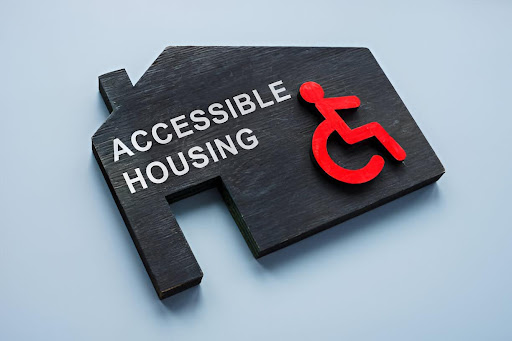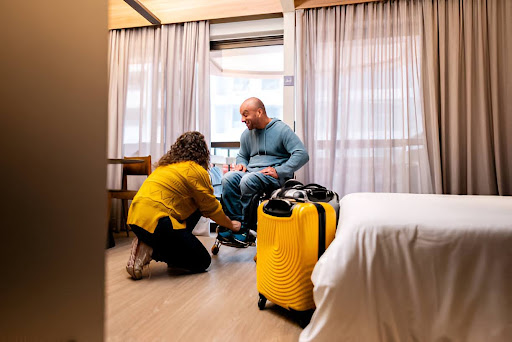Specialist Disability Accommodation Rules

Do you know what NDIS specialist disability accommodation rules are? If not, then let's find it out!
Finding the right home when living with a disability can be difficult, but Specialist Disability Accommodation (SDA) is here to help. Under the NDIS, SDA provides safe, customised housing for individuals who need extra support. It helps them live more independently and improve their quality of life. But how does it work, and who qualifies? Let’s break it down.
Participants can easily understand disability support if they comply with and understand the SDA rules. In this blog, we will address everything related to Specialists Disability Accommodation rules. So, let’s get started.
What is Specialist Disability Accommodation?
SDA homes are specially built for accessibility, safety, and high physical support. They may include wider doorways for wheelchair access, smart home technology for easier control, and reinforced walls for added stability, providing a comfortable and secure living environment.
In addition to this, SDA properties are adaptable and designed for flexibility with the evolving needs of the individual. This enables a person with a disability to live peacefully in their home.
Who is Eligible for SDA According to Specialist Disability Accommodation Rules?

Not all NDIS participants qualify for SDA. The eligibility criteria are strict, which means only significantly disabled people are likely to get this support. To qualify for SDA eligibility criteria, individuals may have:
- Severe Functional Impairments
The SDA participant eligibility requires major disabilities, which limits the person from undertaking daily living activities without support. These impairments include mobility issues, cognitive impairments, or other medical conditions such as chronic illness that restrict their capacity for independent living. - High Support Needs
For disabled individuals, there is a continuing need for support, even with the assistance of assistive technology and environmental modifications. This may include 24-hour personal care or a high level of one-on-one support with daily activities and household work. - Included in the NDIS Plan
The NDIS Specialist Disability Accommodation rules state that SDA has to be listed in the participant's NDIS plan following a detailed assessment. This requires detailed reports by NDIS providers or healthcare professionals.
Understanding SDA Funding
The National Disability Insurance Scheme’s Specialists Disability Accommodation provides funds for housing only. It does not cover any form of personal assistance or support, which is funded separately under NDIS. The funding covers the following aspects:
- Payments to SDA Providers
The NDIS directly pays registered providers for SDA dwellings, which ensures service providers retain quality housing alternatives for participants. - Participant Contributions
Residents incidentally make contributions from rentals or a proportion deducted from their Disability Support Pension (DSP). The amount is capped as a means to provide affordability. - Building Types & Design Categories
The design categories of the SDA properties affect different funding levels. Higher funding is allocated to more specialist housing alternatives to compensate for the extra costs incurred in providing access and safety features.
SDA Design Categories
SDA properties are designed into four categories for the different needs of participants:
- Improved Livability
For those with a sensory, intellectual, or cognitive impairment. These homes have features intended to promote and assist enhanced lifestyle, visual cues, and adaptable layouts with which to assist diverse disabilities. - Fully Accessible
This type of house is for wheelchair users and has accessible bathrooms, kitchens, and entrances. These houses have step-less entry points, automatic doors, and height-adjustable features to allow maximum independence. - High Physical Support
These are houses that include ceiling hoists, emergency power supply, and smart home technology. They are designed for people who need substantial changes to their living environment due to severe mobility disability. - Robust
Built to withstand damage with impact-safe walls and secured environments. These homes are for individuals with behavioural disabilities who might need extra safety features to avert hurting themselves or damaging the property.
Rules and Regulations
The Specialist Disability Accommodation compliance with NDIS rules, along with relevant Australian building standards, is vital to warrant the provision of housing. The laying down of the construction and design specifications for the SDA properties by the SDA Design Standard also embraces:
- Accessibility Features and Structural Integrity
All SDA projects must be endowed with features catering to the mobility needs of residents that include wider hallways, slip-resistant flooring, and structures. - Minimum and Maximum Dwelling Sizes
An SDA property must be appropriately sized as required under the relevant legislation to provide convenient movement for individual mobility aids and also for support staff. - Safety Measures, Including Emergency Exit Plans
SDA properties are expected to have complete emergency response measures, incorporating fire safety measures and exits. - Conformance to Australian Construction Codes
SDA homes comply with national standards regarding construction quality, longevity, and energy productivity. - Choice and Control
The consumer gets the place and kind of living, as defined by the NDIS plan. This provision allows the participant to choose what kind of house they like, depending on their personal choices and preferences.
Key Considerations Before Choosing SDA
There are some considerations one should take into account when looking for an SDA property, such as:
- Location
Being connected with family and having easy access to health and community services is very important. Proximity to family and healthcare institutes can benefit in well-being and timely care. - Support Needs
Determine whether the Specialists Disability Accommodation rules meet your specific requirements for disability. Make sure that the property provides all modifications suitable for daily functioning. - Contributions to Cost
Know what the financial obligations would include in terms of personal contribution to rental costs. Therefore, budget accordingly and know how much NDIS will contribute. - Reputation of the Provider
Choose a reputable and experienced SDA provider that NDIS approves to get good quality service and have compliance met. Learn about these providers, check their reviews, and get a recommendation for a reputable housing option.
How to Apply for SDA
The process of applying for SDA is multifaceted and involves the following steps:
- Assessment and NDIS Planning
To begin with, you must talk to your NDIS planner about the necessity of SDA. This means looking into your present living conditions and future support needs. - Supporting Evidence
The stronger the supporting evidence, such as medical reports, occupational therapy assessments, and other relevant documentation, the better your chances for approval. - Plan Approval
When approved, SDA is funded under the NDIS Specialist Disability Accommodation, which allows you to start looking for appropriate SDA properties. - Finding an SDA Provider
Once funded, you can select a suitable SDA provider and begin the move-in process. Checking out a few different NDIS providers in Melbourne or any other area will help you find the one that best fits your needs.
Conclusion
To sum up, SDA is specifically designed to support individual needs. It is a crucial part of the NDIS plan that promotes independence through housing. The environment to live in must be appropriate and convenient to spend wholesome hours in a boundary. Complying with Specialists’ Disability Accommodation rules allows participants to have ease of access to their homes with purpose-made, fulfilling homes.
Personalised in-home care and support
Fill out the details below and our Care Advisors will get back to you to provide personalised individual support and nursing services, perfectly matched to you.

